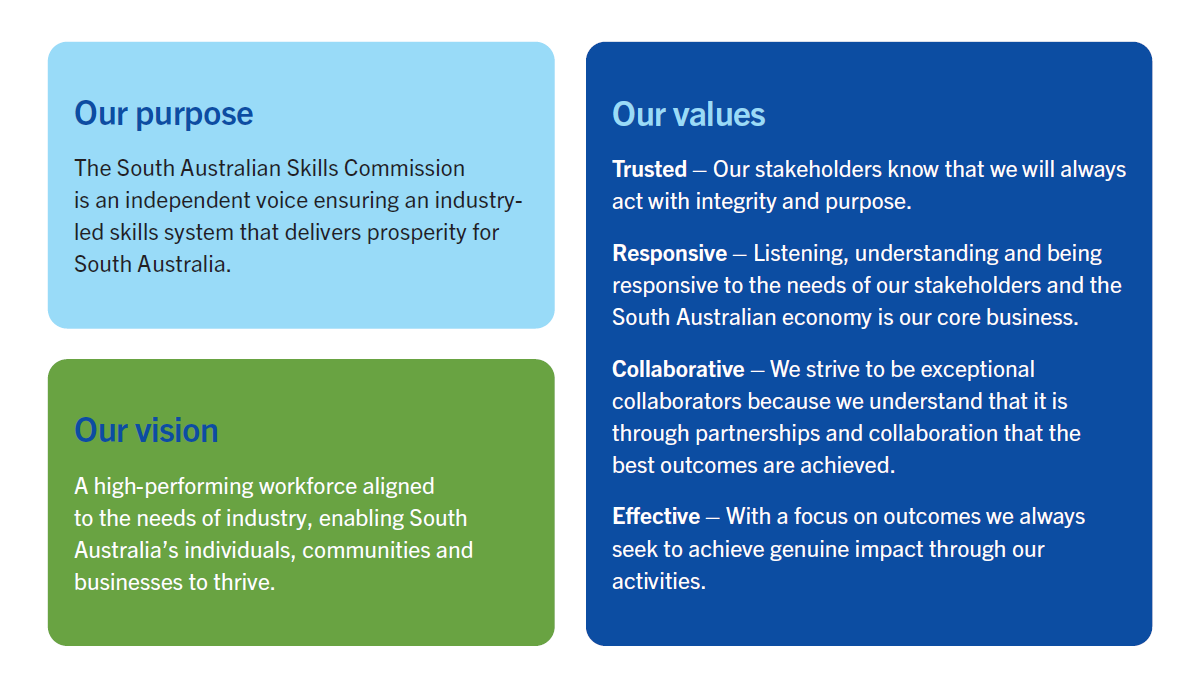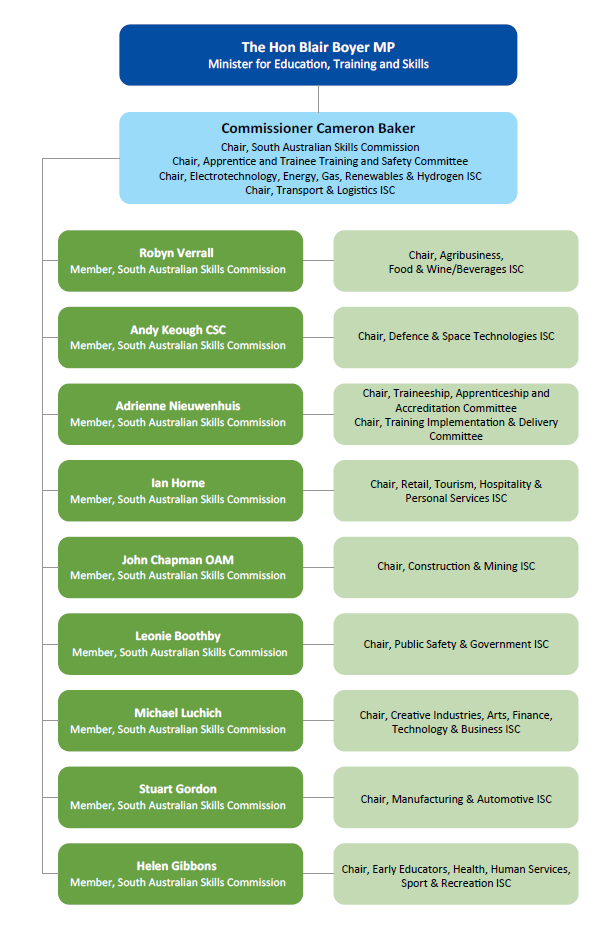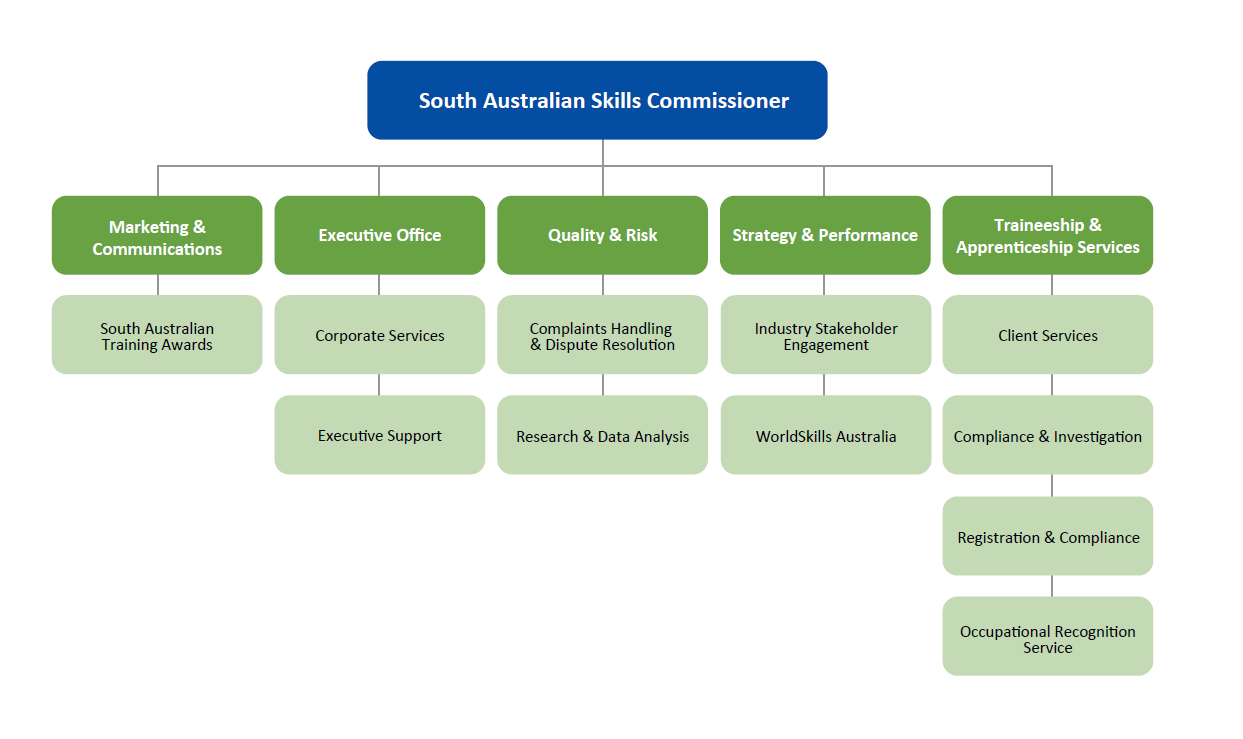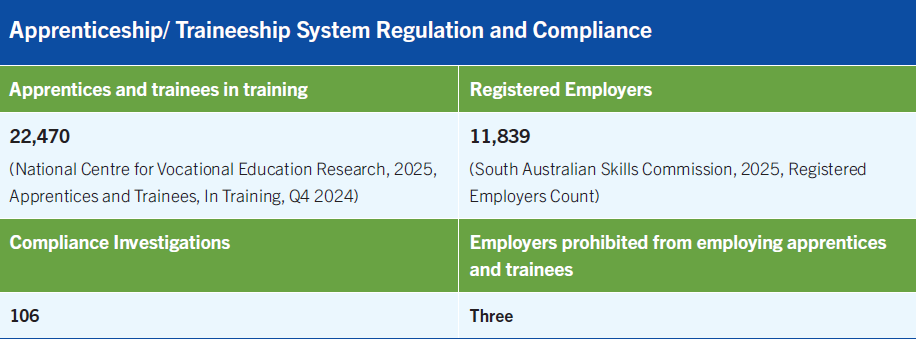It gives me great pleasure to present the South Australian Skills Commission’s annual report, which highlights the achievements and activity of the organisation across the 2024–2025 financial year.
This year has marked a milestone period for the South Australian Skills Commission (the Commission), as the organisation responded to unprecedented demand for skilled workers, supported regional communities to navigate significant economic disruption and worked hard to further the objectives of the state and national skills plans.
Through the National Skills Agreement (NSA), $2.29 billion will be invested in the South Australian skills sector, to implement reforms that will achieve a high-quality, responsive, and accessible vocational education and training (VET) system. This investment will allow South Australia to deliver on national priorities while tailoring solutions to local workforce needs.
The Commission is key to achieving these reforms, by leading and contributing to initiatives that are: improving the quality of apprenticeships and traineeships, strengthening safety and regulatory compliance within the apprenticeship and traineeship system, and increasing apprentice commencements and completions. In particular this year, the NSA has enabled the Commission to significantly increase resources dedicated to regulation, compliance and investigations.
As a result of this, 106 investigations were undertaken this year, with a range of sanctions imposed, including prohibition of three employers from employing apprentices and trainees.
In terms of the Commission’s industry engagement role, the organisation’s ten Industry Skills Councils (ISCs) provide strategic and technical advice across VET, higher education, and workforce development. This year, this included advising Jobs and Skills Councils (JSCs) on national training package development and reviewing the Traineeship and Apprenticeship Pathways (TAP) Schedule to ensure declared trades and vocations remain relevant to industry needs.
In September, the South Australian Training Awards celebrated outstanding achievements in VET within the state, with over 550 guests in attendance. In total, 14 winners were selected from 120 nominations, including South Australia’s first female stonemason, an enrolled nurse supporting Aboriginal health outcomes, and a lighting technician, exemplifying the diversity of the state’s talent.
Winners of the South Australian Training Awards participated in the 2024 Australian Training Awards in December, achieving unprecedented success, securing seven awards across multiple categories.
In December, the Commission launched the Occupational Recognition Service (ORS), another first for the state. The ORS offers a formal qualification pathway for individuals who have not completed an apprenticeship or traineeship but have acquired substantial skills and knowledge through employment, on-the-job experience, or other training.
Opportunities for skilled migration through the ORS were also explored, in order to fill critical skills gaps in key sectors in South Australia. This program demonstrates the Commission’s commitment to addressing skills shortages in South Australia.
In December, the Commission also announced its second degree apprenticeship in mechanical engineering, in partnership with Flinders University, ASC Pty Ltd and BAE Systems Australia. This innovative program provides an ‘earn while you learn’ pathway, equipping students for careers in advanced manufacturing and defence industries.
In 2024–2025, the Commission supported Whyalla and surrounding regions following OneSteel Manufacturing Pty Ltd being placed into administration. This included contributing to the development and promotion of the Whyalla Apprentice Retention Package and maintaining an ongoing staff presence in the city to support employers, apprentices and trainees. These actions ensured that employers were supported to retain apprentices and trainees, minimised workforce disruption and reinforced the Commission’s commitment to regional South Australia.
In May, the Commission reinforced its leadership in apprenticeship reform, announcing the Industry Accelerated Apprenticeship Pilot (IAAP), a three-year initiative commencing in 2026, to fast-track apprenticeships across seven critical trade pathways. To be delivered in partnership with Group Training Organisations (GTOs), the pilot will reduce apprenticeship durations by 12 to 18 months and support up to 1,000 new apprentices, addressing urgent construction workforce needs and increased housing demand.
May also marked the launch of the Early Educators Workforce Attraction Pilot, delivered in partnership with Group Training Employment (GTE) across the Limestone Coast. The program responds to early childhood workforce shortages by offering financial incentives and providing trainees with opportunities to gain experience across multiple early learning environments, with the goal of attracting and retaining educators in the region.
During the year, the Commission commenced work on a pilot to accredit a course under delegation from the Australian Skills Quality Authority (ASQA). The proposed Certificate IV in Non-Destructive Testing is designed to create a new entry-level pathway critical to supporting workforce needs in defence and advanced manufacturing.
This year, South Australia excelled at the WorldSkills National Championships in Brisbane, with Team SA winning three gold, seven silver and six bronze medals, as well as being awarded 12 certificates of excellence. Team SA increased from a team of seven in 2023 to a team of 63 in 2025.
At the conclusion of the event, it was announced that Adelaide will host the 2027 WorldSkills Australia National Championships and Skills Show, taking the national stage to lead a celebration of talent, innovation, and excellence in VET.
I extend my sincere thanks to the Honourable Blair Boyer MP, Minister for Education, Training and Skills, and to the Commission Board for their support during 2024–2025. I also wish to acknowledge the important contributions of outgoing Commission members, Ms Adrienne Nieuwenhuis and Ms Leonie Boothby.
The Commission’s secretariat has been instrumental to the success of the organisation this year, and I also thank all team members for their valuable
contributions.
As South Australia’s skills system enters a new phase of transformation, we look ahead with purpose and confidence. The Commission’s new Strategic Plan 2025–2030, launched in mid 2025, will provide the blueprint for action over the next five years, positioning the Commission to continue to play a leadership role in the critical work of skills system reform.
Thank you to all Commission stakeholders for your ongoing commitment. Together, we are shaping a vibrant, inclusive, and responsive skills system.
Commissioner Cameron Baker
Chair of the South Australian Skills Commission








